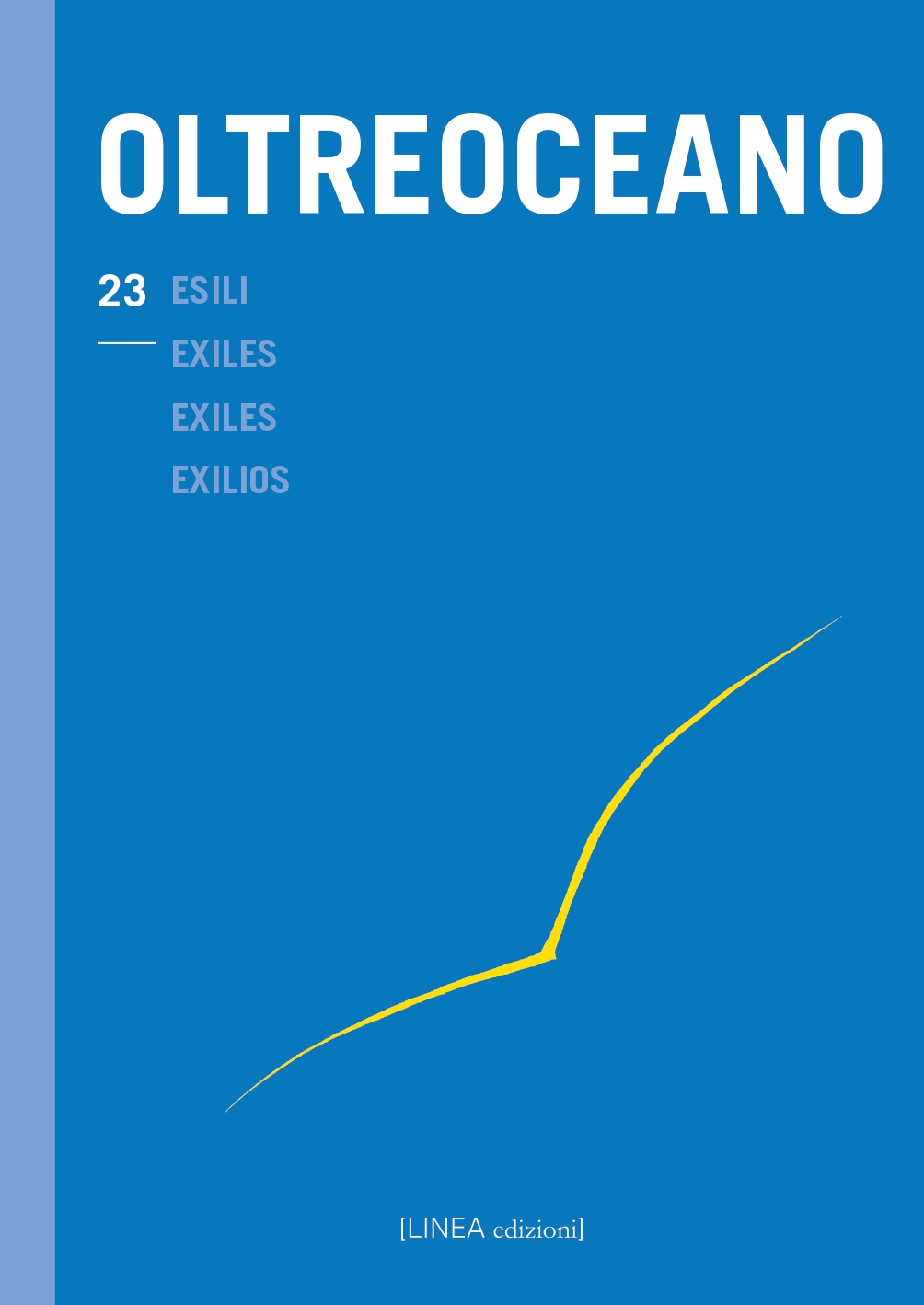Losses and Abandonments in Clara Obligado’s Una casa lejos de casa. La escritura extranjera
DOI:
https://doi.org/10.53154/Oltreoceano112Keywords:
Clara Obligado, Exile, precarioussness, WritingAbstract
This article studies the theme of exile in the book of the Argentine writer based in Spain, Clara Obligado, Una casa lejos de casa. La escritura extranjera (2020). The written reflects on life in transit, without a precise location. Argentina and Spain are two countries that share the same language that can be, at the same time, very different. Learning to use two similar and, at the same time, dissimilar languages is the challenge faced by the author whose existence takes place in a kind of non-place, in a precarious condition. The essay recounts this problematic space, in a clear challenge to political positions that are nourished by discrimination. Spain was the country chosen by many Argentinians who left their land during the last 45 years. There were several reasons; the common language, the ease of access, the Spanish ancestors of the young people stalked by their political ideas. Among the many difficulties involved in settling in another land, we must highlight the work involved in the desire to avoid contamination of the language or, as often happens, accepting a mixed result that ends up being neither Spanish nor Argentine or being the two at a time. This new literature that has emerged in Spain for decades, the result of the exile and diaspora of many non-Spanish artists by birth, is defined in different ways; For some critics, it presents hybrid characteristics (Canclini 1990), transcultural (González Dopazo 2009), extraterritorial (Noguerol 2008), or it is a deterritorialized literature (Guerrero 2012), or of the border (Noguerol 2019). Various labels that indicate diverse characteristics that point to a literary panorama in motion that destabilizes classic categories.
Downloads
References
Alarcón, J. I. & Salazar, A. I. (2020): Una escritora extranjera. Entrevista a Clara Obligado. Recuperado de https://revistacontrapunto.com/una-escritora-extranjera-entrevista-a-clara-obligado/ (Visitado el 30/03/2024).
Burgos Ballester, L. (2021): Obligado, Clara. Una casa lejos de casa. La escritura extranjera. Kamchatka. Revista de análisis cultural, 17, pp. 573-577.
Ferrero, A. (2016): Entrevista con Clara Obligado. Confluencia, 31, 2, pp. 184-194.
García Canclini, N. (2001): Culturas hibridas. Estrategias para entrar y salir de la modernidad. Buenos Aires: Paidós.
González Dopazo, O. (2009): La expresión de la identidad cultural en las obras de los escritores italo-quebequeses. Çedille. Revista de Estudios Franceses, 5, pp. 164-181.
Guerrero, G. (2012): Literatura, nación y globalización en Hispanoamérica: explorando el horizonte post-nacional. Revista de Estudios Hispánicos, 46, pp. 73-81.
Mendoza, A. (2015): La argentina Clara Obligado juega al mestizaje de géneros en su nuevo libro. Recuperado de http://www.efe.com/efe/espana/cultura/la-argentina-clara-obligado-juega-al-mestizaje-de-generos-en-su-nuevo-libro/10005-2545152 (Visitado el 10/02/2024).
Noguerol Jiménez, F. (2008): Narrar sin fronteras. En J. Montoya Suárez, Entre lo local y lo global: la narrativa latinoamericana en el cambio de siglo (1990-2006) (pp. 19-33). Madrid: Iberoamericana.
Noguerol Jiménez, F. (2019): Últimas tendencias y promociones. En T. Barrera López, Historia de la literatura hispanoamericana III (pp. 167-179). Madrid: Cátedra.
Obligado, C. (2005): Las otras vidas. Madrid: Páginas de Espuma.
Obligado, C. (2011): El libro de los viajes equivocados. Madrid: Páginas de Espuma.
Obligado, C. (2015): La muerte juega a los dados. Madrid: Páginas de Espuma.
Obligado, C. (2020): Una casa lejos de casa. La escritura extranjera. Valencia: Contrabando.
Ortuño Martínez, B (2020): La historia pendiente: exiliadas argentinas de los setenta. Una aproximación a través de las cartas. Anuario de Estudios Americanos, 77, 1, pp. 113-135.
Romero, L.A. (2012): El proceso 1976-1983. En Breve historia contemporánea de la Argentina. 1916-1010 (pp.294-338). Buenos Aires: Fondo de Cultura Económica.
Romero Morales, Y. (2023). El exilio habitado de Clara Obligado en Una casa lejos de casa. La escritura extranjera (2020): extranjería, lengua y gastronomía. Cuadernos para la investigación de la literatura hispánica, 49, pp. 145-163.
Saer, J.J (1982): La mayor. Buenos Aires: Centro Editor de América Latina.
Zovko, M. (2017): En la otra orilla: reflexiones en torno a experiencias migratorias en España en la narrativa de los últimos años. En E. Bou y J. Zarco, Fronteras y migraciones en ámbito mediterráneo (pp. 57-68). Venezia: Ca’ Foscari.
Downloads
Published
How to Cite
Issue
Section
License

This work is licensed under a Creative Commons Attribution-NonCommercial-ShareAlike 4.0 International License.
The authors undertake to comply with the following conditions, which are considered accepted at the time of submission of their contributions.
The sending of a text implies that it is unpublished and not submitted to be published elsewhere.
1. If accepted, the author shall confer on the publisher the right to publish and distribute it both in paper form and in the online electronic edition. The published articles will be downloadable and made available in open access.
2. Provided that it correctly indicates that the first publication took place in the journal Oltreoceano. Rivista sulle migrazioni the author has the right to: a) reproduce the article in separate extracts or collected in a volume; b) publish the article on their personal website or teaching site provided that these sites are of a non-commercial nature; c) deposit the article in online archives of a non-commercial nature, linked to the institution they belong to or as part of projects for the non-commercial dissemination and open access of scientific works.
The use of contributions by third parties, for commercial or otherwise unauthorized purposes, is not allowed. The publisher declines all responsibility for the unauthorized use of the material published in the journal.












